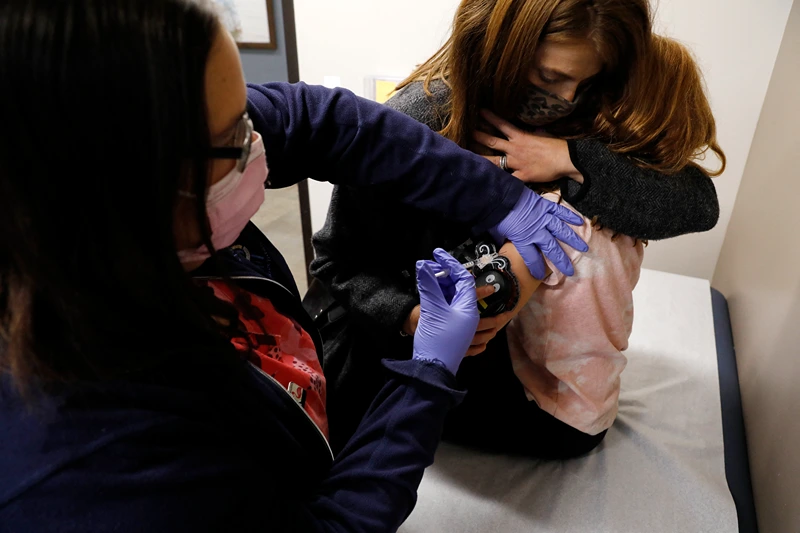
OAN Staff Blake Wolf
1:07 PM – Wednesday April 23, 2025
Health and Human Services (HHS) Secretary Robert F. Kennedy Jr. (RFK Jr.) is reportedly evaluating the potential removal of COVID-19 vaccines from the Centers for Disease Control and Prevention’s recommended immunization schedule for children in the U.S.
Advertisement
Kennedy has been an especially vocal critic of COVID-19 vaccinations for children, frequently citing studies that underscore the exceptionally low mortality risk that the virus poses to the pediatric population.
“The recommendation for children was always dubious,” Kennedy recently stated, when asked about the current Centers for Disease Control and Prevention’s (CDC) recommendation for children to receive the COVID-19 vaccine.
The current vaccine schedule by the CDC recommends that children, even those as young as six-months-old, receive mRNA COVID-19 vaccines.
“Kids had almost no risk for COVID-19… certain kids that had very profound morbidities may have a slight risk but most kids don’t so why are we giving this to tens of millions of kids when the vaccine itself does have profound risk?” he continued.
“We’ve seen huge associations of myocarditis and pericarditis with strokes, with other injuries, with neurological injuries and this was clear even in the clinical data that came out of Pfizer. There were actually more deaths, about 23% more deaths in the vaccine group than the placebo group.”
“My position is that if you want a vaccine, you ought to be able to get a vaccine,” he added. “But you ought to know the safety profile and the risk profile and the efficacy of that vaccine.”
If Kennedy moves to reverse the CDC’s decision to include the COVID-19 vaccine on the recommended childhood immunization schedule, it would not prohibit parents from choosing to vaccinate their children with the mRNA jab.
However, such a shift could have broad implications for pediatric vaccination practices nationwide — as healthcare providers commonly rely on the CDC schedule to guide the timing and administration of childhood immunizations.
Kennedy has been consistently smeared by left-wing media outlets who claim he is “anti-vaccine” across the board, which he has since debunked at his Senate confirmation hearing and a number of other times as well. The HHS secretary has reiterated that he is not “anti-vaccine or anti-industry,” but rather “pro-safety.”
Additionally, the National Library of Medicine, which is run by the National Institutes of Health (NIH), has also since reported some alarming information in regard to myocarditis, which is inflammation of the heart muscle, and mRNA COVID-19 vaccines. “We found the number of myocarditis reports in VAERS after COVID-19 vaccination in 2021 was 223 times higher than the average of all vaccines combined for the past 30 years. This represented a 2500% increase in the absolute number of reports in the first year of the campaign when comparing historical values prior to 2021. Demographic data revealed that myocarditis occurred most in youths (50%) and males (69%). A total of 76% of cases resulted in emergency care and hospitalization. Of the total myocarditis reports, 92 individuals died (3%). Myocarditis was more likely after dose 2 (p
Kennedy continued, stating: “All of my kids are vaccinated, and I believe vaccines have a critical role in healthcare.” However, he also added that “in my advocacy, I have disturbed the status quo by asking uncomfortable questions. Well, I won’t apologize for that. We have massive health problems in this country that we must face honestly.”
HHS spokesperson Andrew Nixon also addressed the surge of media inquiries, clarifying—according to Politico—that “no final decision has been made” concerning potential changes to the vaccine schedule.
Kennedy has vowed to take on chronic illnesses in the United States, and especially those affecting America’s youth.
He also noted recently that he is pulling HHS resources in order to further research the rise in autism in children. Two decades ago, 1-in-150 children were diagnosed on the autism spectrum, though this has shot up to 1-in-36 children today, marking a dramatic increase — according to the CDC.
The National Institutes of Health (NIH) Director Dr. Jay Bhattacharya stated that the HHS is pooling together “comprehensive” patient data of the U.S. population for the first time, providing “broad coverage” and driving more accurate results. The data will then be provided to around 10 to 20 outside research groups who will receive grant funding.
Lastly, the NIH will then sift through the “highest quality proposals” ranging from “basic science to epidemiological approaches, to other more applied approaches” to treat and manage autism.
“I recognize, of course, that autism, there’s a range of manifestations ranging from highly functioning children to children that are quite severely disabled. And of course the research will account very carefully for that,” he continued. “What we’re proposing is a transformative real-world data initiative, which aims to provide a robust and secure computational data platform for chronic disease and autism research.”
Stay informed! Receive breaking news blasts directly to your inbox for free. Subscribe here. https://www.oann.com/alerts
Advertisements below




